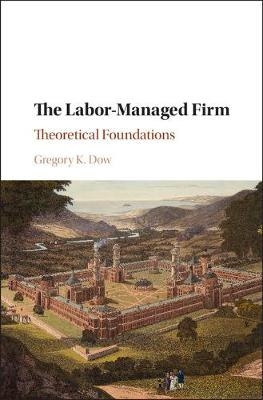
The Labor-Managed Firm
Cambridge University Press (Verlag)
978-1-107-13297-9 (ISBN)
In previous work, Gregory K. Dow created a broad and accessible overview of worker-controlled firms. In his new book, The Labor-Managed Firm: Theoretical Foundations, Dow provides the formal models that underpinned his earlier work, while developing promising new directions for economic research. Emphasizing that capital is alienable while labor is inalienable, Dow shows how this distinction, together with market imperfections, explains the rarity of labor-managed firms. This book uses modern microeconomics, exploits up-to-date empirical research, and constructs a unified theory that accounts for many facts about the behavior, performance, and design of labor-managed firms. With a large number of entirely new chapters, comprehensive updating of earlier material, a critique of the literature, and policy recommendations, here Dow presents the capstone work of his career, encompassing more than three decades of theoretical research.
Gregory K. Dow has been Professor of Economics at Simon Fraser University, British Columbia since 1995 and chaired the economics department during 2001–6. He has held previous academic positions at the University of Alberta and Yale University, Connecticut. His articles have appeared in the leading journals of the profession, including the American Economic Review and the Journal of Political Economy. His previous book Governing the Firm: Workers' Control in Theory and Practice was published by Cambridge in 2003.
Part I. Setting the Stage: 1. The puzzling asymmetry; Part II. Perfection and Symmetry: 2. Profit maximization and control rights; 3. The labor-managed firm in the short run; 4. The labor-managed firm in the long run; 5. The labor-managed firm in general equilibrium; Part III. Imperfection and Asymmetry: 6. Empirical asymmetries (I); 7. Empirical asymmetries (II); 8. The rarity of labor-managed firms; Part IV. Appropriation Problems: 9. Imperfect appropriation; 10. Firm formation with adverse selection; 11. Partnership markets with adverse selection; Part V. Public Good Problems: 12. Collective choice and investor takeovers; 13. Free riding and employee buyouts; Part VI. Opportunism Problems (I): 14. Transaction cost economics; 15. Firm-specific investments; Part VII. Opportunism Problems (II): 16. Asset ownership and work incentives; 17. Capital stocks and labor flows; 18. Honest and dishonest controllers; Part VIII. Synthesis and Agenda: 19. Breaking the symmetry; 20. Policy directions.
| Erscheinungsdatum | 25.04.2018 |
|---|---|
| Verlagsort | Cambridge |
| Sprache | englisch |
| Maße | 156 x 235 mm |
| Gewicht | 800 g |
| Themenwelt | Wirtschaft ► Betriebswirtschaft / Management ► Planung / Organisation |
| ISBN-10 | 1-107-13297-5 / 1107132975 |
| ISBN-13 | 978-1-107-13297-9 / 9781107132979 |
| Zustand | Neuware |
| Informationen gemäß Produktsicherheitsverordnung (GPSR) | |
| Haben Sie eine Frage zum Produkt? |
aus dem Bereich


